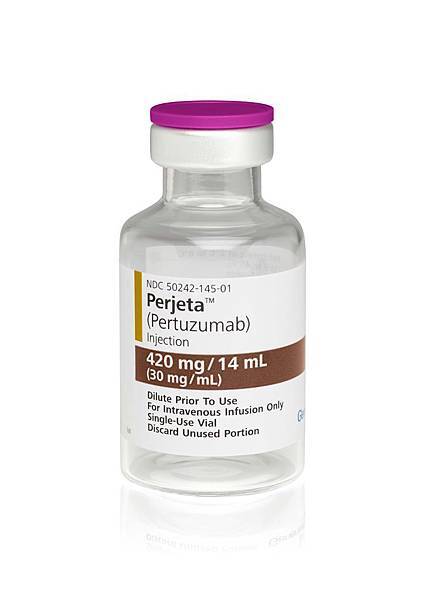
美國食品藥物管理局〔2012-06-08〕批准了 Perjeta (Pertuzumab)用於治療 HER2 陽性的晚期(轉移性)乳腺癌患者。
A new drug that targets HER2-positive breast cancer, pertuzumab (Perjeta, Genentech/Roche), has been approved in the United States. About one quarter of all cases of breast cancer are HER2-positive.
Pertuzumab is approved for use in combination with the first HER2therapy ever launched, trastuzumab (Herceptin, Genentech/Roche), and with the chemotherapy agent docetaxel. It is indicated for use in patients with metastatic HER2-positive breast cancer who have not received previous treatment with either chemotherapy or HER2-targeted therapy.
The approval, granted by the US Food and Drug Administration (FDA) after a priority review, is based on the results of the phase 3 CLEOPATRA (Clinical Evaluation of Pertuzumab and Trastuzumab) trial. A similar application is under review at the European Medicines Agency.
These results were presented in December 2011 at the San Antonio Breast Cancer Symposium and were published in the New England Journal of Medicine (2012;366:109-119), as reported at the time by Medscape Medical News.
In the CLEOPATRA trial, the addition of pertuzumab significantly increased progression-free survival, compared with trastuzumab plus docetaxel (18.5 vs 12.4 months; hazard ratio, 0.62; P < .001).
"This is huge. It is very uncommon to have a clinical trial show this level of improvement in progression-free survival," lead author José Baselga, MD, PhD, said at the time. He is professor of medicine at Harvard Medical School and associate director of the Massachusetts General Cancer Center in Boston.
"The results are better than imagined. This is a fairly robust improvement," Harold Burstein, MD, from the Dana-Farber Cancer Institute in Boston, noted at the meeting. He predicted that the 3-drug combination "is likely to become a standard of care in this setting."
At the time, overall survival data were not mature, but there was a trend favoring pertuzumab. There were 69 deaths in the 402 patients (17.2%) receiving the 3-drug combination and 96 deaths in the 406 patients (23.6%) receiving the 2-drug combination, Dr. Baselga reported.
The addition of pertuzumab to trastuzumab and docetaxel resulted in "only minimal side effects," and the 3-drug combination was "remarkably safe and well tolerated," Dr. Baselga explained. There was an increase in febrile neutropenia (48.9% vs 45.8%) and diarrhea of grade 3 or higher (7.9% vs 5.0%), but there was no increase in left ventricular systolic dysfunction (1.2% vs 2.8%).
Synergy With Trastuzumab
"Since trastuzumab was first approved more than a decade ago, continued research has allowed us to better understand the role that HER2 plays in breast cancer," said Richard Pazdur, MD, director of the Office of Hematology and Oncology Products, Center for Drug Evaluation and Research, at the FDA.
"This research provided the background to combine 2 targeted drugs...with docetaxel to slow disease progression in breast cancer," Dr. Pazdur said when he announced the approval of pertuzumab.
When tested as a single agent early in its development, pertuzumab showed only modest antitumor activity; however, it demonstrated synergy when used with trastuzumab. Although both products are humanized monoclonal antibodies that stimulate antibody-dependent cell-mediated cytotoxicity, the 2 products bind at different points on HER2. Because they have slightly different mechanisms of action, the 2 agents together provide "a more comprehensive blockade of HER2 signaling and result in greater antitumor activity than either agent alone," Dr. Baselga explained.
It is expected that pertuzumab will be available in the United States in 2 weeks. There has a been a problem with manufacturing; a cell growth issue threatened to affect future supply of the agent. The FDA decided to go ahead and approve the drug "and not delay its availability to patients pending resolution of production issues...given the need for additional treatments for metastatic breast cancer," said Janet Woodcock, director of the FDA Center for Drug Evaluation and Research.
Genentech said it is working with the FDA to ensure a consistent manufacturing process and supply of the drug to patients who need it.
Pertuzumab costs $5900 per month, so around $71,000 per year.
Pharmaceutical industry analysts predict that the product will be just as successful as trastuzumab, which generated global sales of nearly $6 billion in 2011.
Analysts note that the priority review and approval of pertuzumab bodes well for another targeted agent waiting in the wings — T-DM1 (Roche) — which is a combination of trastuzumab plus a cytotoxic. T-DM1 is also destined for the treatment of HER2-positive metastatic breast cancer, although it has been tested in a different patient population (patients who had previously received trastuzumab and taxanes). Results for T-DM1, reported just last week, were well received by the breast cancer community; they are now being prepared for an approval submission.
The CLEOPATRA study was sponsored by Genentech and Roche.





 留言列表
留言列表
 線上藥物查詢
線上藥物查詢 